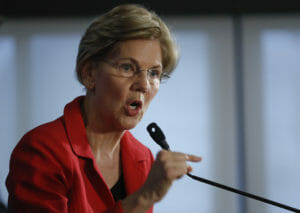‘Judicial Activism’ on Campaign Finance Law
The Supreme Court may soon allow an unlimited amount of corporate money into the political process. Imagine drug companies and banks running their own ads against legislators who vote against their interests.Alabama Sen. Jeff Sessions, the top Republican on the Judiciary Committee, said last week that he would vote against confirming Sonia Sotomayor to the Supreme Court because he doubts she will “resist the siren call of judicial activism.”
If that’s what he’s worried about, there are some sitting justices whom Sessions might want to lash to the mast — quickly. Except these justices tend to be in Sessions’ ideological camp.
Next month, even before the traditional first Monday in October opening and almost certainly with Sotomayor on the bench, the court will hear a campaign finance case that illustrates the activist itch among its conservatives.
Rehear it, actually. In a surprise move on the last day of the term, the court announced that it would hold a new argument in the case — and that it would consider overruling two precedents upholding limits on corporate money in the political process.
Talk about judicial activism.
One case, from 1990, Austin v. Michigan Chamber of Commerce, held that corporations could be barred from spending their own funds — as opposed to using a political action committee to which employees contribute — to urge a candidate’s election or defeat.
The second, part of the 2003 decision upholding the McCain-Feingold campaign finance law, said that the prohibition on corporate spending could be extended to “electioneering communications” — advertising that mentions a candidate shortly before an election even if it doesn’t explicitly support or oppose that person.
Three justices — Antonin Scalia, Anthony Kennedy and Clarence Thomas — have called for Austin to be overturned. Chief Justice John Roberts and Justice Samuel Alito, no fans of campaign finance regulations, seem tempted to go along.
Overruling Austin would be a disaster, and curtailing McCain-Feingold only slightly less so. The floodgates would be opened for corporations, and labor unions, to run ads supporting or attacking candidates — not only in federal campaigns, but in the 22 states that now prohibit such spending. The only restriction would be that they couldn’t give to candidates directly.
Imagine the 2010 election in a post-Austin world, with drug companies going after members of Congress who vote against their interests, or banks targeting lawmakers who backed tighter regulation. It’s not as if these industries lack political power now, but consider what kind of legislation would result if lawmakers had to fear that an industry they defied could spend an unlimited amount to defeat them at the next election.
The pending dispute is a hard case, but it doesn’t require the justices to make bad law.
It involves “Hillary: The Movie,” produced by a conservative group, Citizens United, during the 2008 presidential election campaign. Citizens United wanted to pay a cable channel to make the movie available as a video on demand. It went to court, seeking an order that it be permitted to do so.
The film, as Justice Stephen Breyer aptly put it during the first oral argument, “is not a musical comedy.” It portrays Clinton as a “congenital liar” with a “tendency to manipulate, deceive and destroy for personal gain,” while it emphasizes the stakes in the forthcoming election.
In short, this is precisely the sort of cantankerous political speech that ought to be protected under the First Amendment. The problem is that for purposes of federal election law, nonprofit Citizens United is treated the same as Wal-Mart because it takes corporate as well as individual donations.
We don’t want Wal-Mart — at least I don’t — using its purchasing power to buy elections, and we don’t want Wal-Mart funneling money to a nonprofit proxy. But how to keep Wal-Mart out of the candidate-electing business while protecting the speech of ideological groups?
The justices, understandably, seemed nervous about this puzzle, especially when the government’s lawyer, during oral arguments in the case, said the government would also be acting constitutionally if it prohibited corporate funding of a similarly anti-Hillary book.
The smart, not to mention judicially restrained, approach would be for the court to take one of several available escape hatches, much as it did in avoiding a final verdict on the constitutionality of the Voting Rights Act. It could say that because Citizens United took such a small amount of corporate money, it should not be subjected to the same rules as a regular for-profit corporation. (This is already true for ideological nonprofit groups that don’t take any corporate funds.) It could say an on-demand video is not the same as a commercial.
As it happens, the first case on which soon-to-be-justice (the vote is this week) Sotomayor will sit comes in an area in which she has some expertise: Sotomayor served on the New York City Campaign Finance Board. She wrote in a 1996 law review article: “Can elected officials say with any credibility that they are carrying out the mandate of a ‘democratic’ society, representing only the general public good, when private money plays such a large role in their campaigns?”
Maybe her conservative colleagues, before lunging to overrule precedents, could take some counsel from a wise Latina.
Ruth Marcus’ e-mail address is marcusr(at)washpost.com.
© 2009, Washington Post Writers Group
Your support matters…Independent journalism is under threat and overshadowed by heavily funded mainstream media.
You can help level the playing field. Become a member.
Your tax-deductible contribution keeps us digging beneath the headlines to give you thought-provoking, investigative reporting and analysis that unearths what's really happening- without compromise.
Give today to support our courageous, independent journalists.




You need to be a supporter to comment.
There are currently no responses to this article.
Be the first to respond.